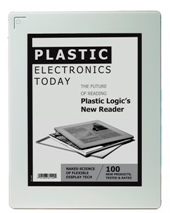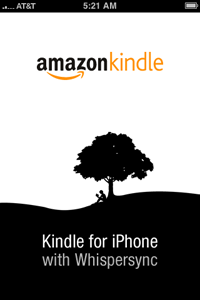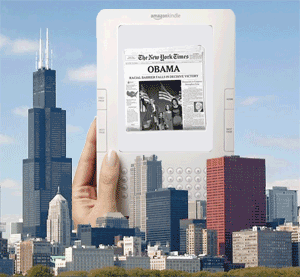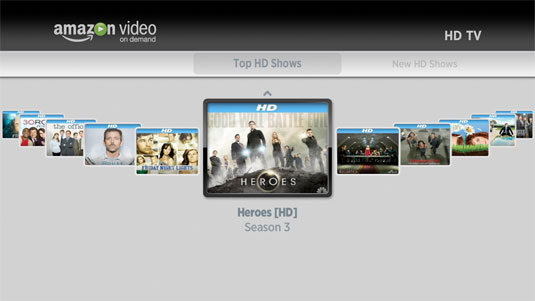 Amazon has unveiled its new, larger Kindle, and it’s pretty much what you’d guess it would be–a device that looks a lot like today’s Kindle 2, with more screen real estate. The Kindle DX has a 9.7-inch screen (that’s twice the space of the 2’s 6 inches), costs $489, and is shipping some time this summer. It’s got the built-in capability to read PDF files, and the larger, 1280-by-824 display means it can show magazine pages without reformatting.
Amazon has unveiled its new, larger Kindle, and it’s pretty much what you’d guess it would be–a device that looks a lot like today’s Kindle 2, with more screen real estate. The Kindle DX has a 9.7-inch screen (that’s twice the space of the 2’s 6 inches), costs $489, and is shipping some time this summer. It’s got the built-in capability to read PDF files, and the larger, 1280-by-824 display means it can show magazine pages without reformatting.
Like an iPhone, the Kindle auto-rotates the display when you flip the device into landscape orientation. And it’s got 3.3GB of available memory, good for storing up to to 3,500 books (the Kindle 2 stores 1,500).
The screen uses the same E-Ink technology as the Kindle 2; Jeff Bezos’s letter repeats Amazon’s mantra that it “looks and reads like real paper,” and says that text and images are “amazingly sharp.” But even though the DX will be able to show photos and other art at a comfortable large size, E-Ink’s sixteen shades of gray will have trouble making anything that was originally in color look “amazing.”
Besides the newspapers and magazines that are already available in Kindle format, a bunch of textbook publishers have signed on to produce tomes for the new Kindle, and several colleges say they’ll distribute Amazon’s new gadget to students. Sounds good to me: I still wince when I remember lugging my backpack full of books, and wince even more when I recall how absurdly expensive many textbooks were.
And here’s something a little weird: If you sign up for a long-term subscription to the New York Times, the Boston Globe, or the Washington Post, you can get a discount off the DX’s somewhat intimidating pricetag–but only people who live in areas where they can’t get home delivery of the dead-tree versions of the papers qualify. Sorry, tech-savvy locals!
 The Kindle DX would seem to be a great big Amazonian shot across the bow of Plastic Logic’s similar reader. Plastic Logic announced its device last September, but doesn’t plan to ship it until early 2010, which gave Amazon plenty of time to steal some of its thunder. It too has a big E-Ink screen and PDF capability (as well as support for Microsoft Office and other formats); it uses a touchscreen instead of buttons and a keyboard, and has Wi-Fi instead of the Kindle’s EVDO. It’s still an intriguing device, and I don’t think it’s aiming at precisely the same audience as the Kindle DX–Plastic Logic envisions businesspeople loading up their reader with Word documents and PowerPoints. But it’ll be the second one in its category when it shows up, not the first. I wonder if Amazon would have come up with the DX if it didn’t know that the Plastic Logic device was in the works?
The Kindle DX would seem to be a great big Amazonian shot across the bow of Plastic Logic’s similar reader. Plastic Logic announced its device last September, but doesn’t plan to ship it until early 2010, which gave Amazon plenty of time to steal some of its thunder. It too has a big E-Ink screen and PDF capability (as well as support for Microsoft Office and other formats); it uses a touchscreen instead of buttons and a keyboard, and has Wi-Fi instead of the Kindle’s EVDO. It’s still an intriguing device, and I don’t think it’s aiming at precisely the same audience as the Kindle DX–Plastic Logic envisions businesspeople loading up their reader with Word documents and PowerPoints. But it’ll be the second one in its category when it shows up, not the first. I wonder if Amazon would have come up with the DX if it didn’t know that the Plastic Logic device was in the works?
 For decades, books have come in two major variants: Big, expensive hardcovers and smaller, cheaper paperbacks. Now Amazon.com’s Kindle e-book line has splintered in a similar fashion: The company has started shipping its $489 Kindle DX, which feels like it’s playing weighty hardcover to the more portable, paperback-like $359 Kindle 2. Like its little brother, the DX is brilliantly cool in some respects and surprisingly clunky in others. Overall, it’s good enough to tempt serious book junkies right now, but also whets the appetite for more advanced book-reading gizmos to come.
For decades, books have come in two major variants: Big, expensive hardcovers and smaller, cheaper paperbacks. Now Amazon.com’s Kindle e-book line has splintered in a similar fashion: The company has started shipping its $489 Kindle DX, which feels like it’s playing weighty hardcover to the more portable, paperback-like $359 Kindle 2. Like its little brother, the DX is brilliantly cool in some respects and surprisingly clunky in others. Overall, it’s good enough to tempt serious book junkies right now, but also whets the appetite for more advanced book-reading gizmos to come.
 Amazon.com, whose first pass at putting Kindle e-books on the iPhone was
Amazon.com, whose first pass at putting Kindle e-books on the iPhone was  The Kindle DX would seem to be a great big Amazonian shot across the bow of
The Kindle DX would seem to be a great big Amazonian shot across the bow of  [UPDATE: Amazon’s announcing something on Monday–it’s sent out
[UPDATE: Amazon’s announcing something on Monday–it’s sent out  Hey, BlackBerry fans, good news:
Hey, BlackBerry fans, good news:
